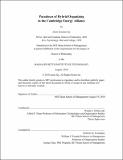Paradoxes of hybrid organizing in the Cambridge Energy Alliance by Jason Jesurum Jay.
Author(s)
Jay, Jason Jesurum
DownloadFull printable version (5.493Mb)
Other Contributors
Sloan School of Management.
Advisor
Wanda J. Orlikowski.
Terms of use
Metadata
Show full item recordAbstract
Hybrid organizations combine institutional logics, often in a search for novel solutions to complex problems such as climate change. This dissertation explores the conditions under which hybrid organizations are effective in realizing such solutions, along with the processes that strengthen or dissipate their distinctive capabilities. Building upon an in-depth field study of the public-private Cambridge Energy Alliance and its network of exchange partners, I argue that sustaining effective, innovative hybrid organizations is more likely when internal and external stakeholders navigate two paradoxes characteristic of hybrid organizing. The first is the paradox of hybrid legitimacy: hybridity expands success to a broader range of exchange relationships, but undermines exchange partners' willingness to commit resources to an organization that defies conventional schemas and familiar types. Evidence collected in this dissertation suggest that this paradox can be successfully navigated by offering options for exchange that fit into conventional schemas, working with others who are accustomed to the hybridity, or using interpersonal trust within structural and friendship ties as a scaffold for legitimacy. The second is the catalyst's paradox: alternative institutional logics have varied definitions of success that conflict, as when the organization catalyes but cannot capitalize on exchanges. Data suggest that this second paradox can be successfully navigated through reflective thinking, developing variable and complex practices, and cultivating resource streams that reward the organization for serving the whole and pasts of a constituency simultaneously. Absent such strategies, the paradoxes of hybrid organizing are experienced as a challenge to coherent sensemaking and effective action, leading to patterns of inaction, oscillation among simplified patters of action, and therefore reduction in organizational complexity and effectiveness.
Description
Thesis (Ph. D.)--Massachusetts Institute of Technology, Sloan School of Management, 2010. This electronic version was submitted by the student author. The certified thesis is available in the Institute Archives and Special Collections. Cataloged from student submitted PDF version of thesis. Includes bibliographical references (p. 171-186).
Date issued
2010Department
Sloan School of ManagementPublisher
Massachusetts Institute of Technology
Keywords
Sloan School of Management.